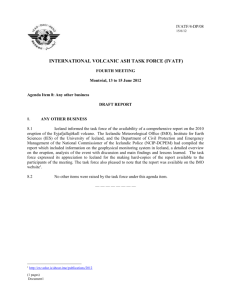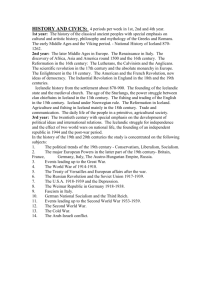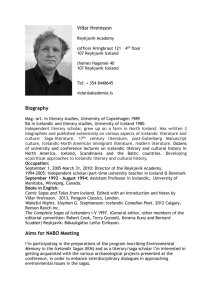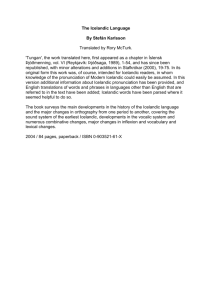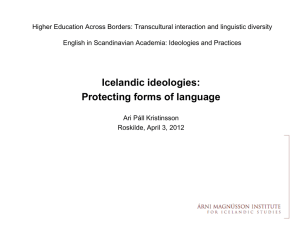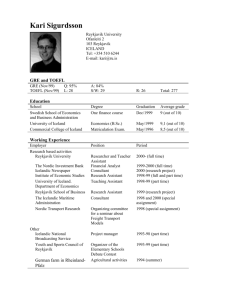iceland - International Press Institute
advertisement
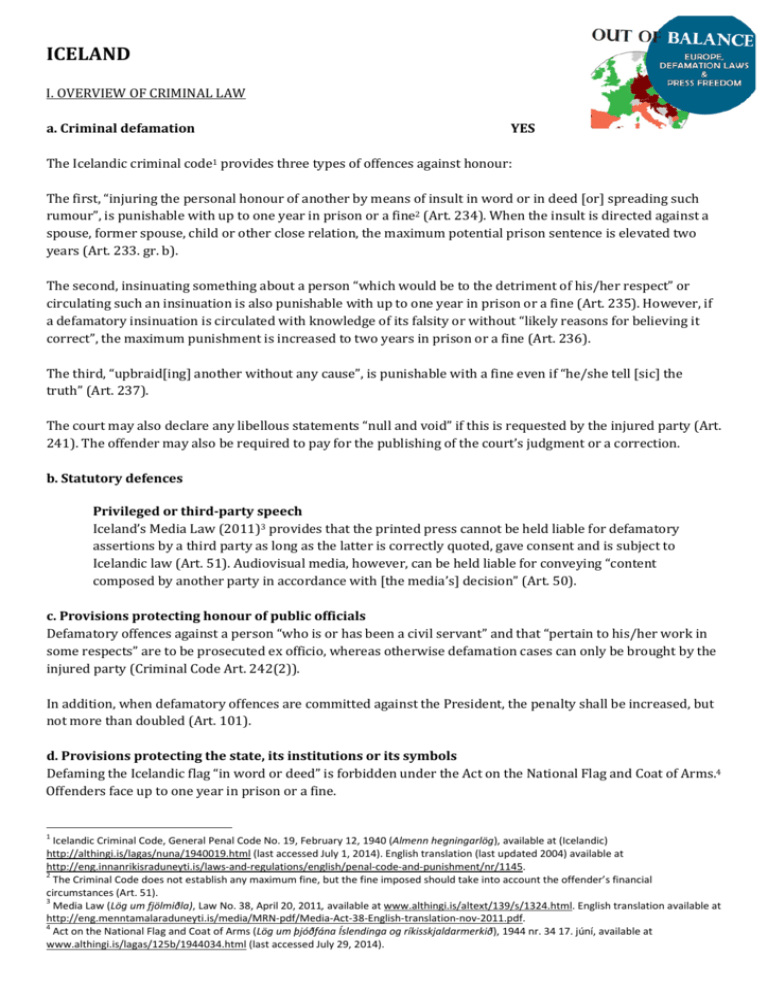
ICELAND
I. OVERVIEW OF CRIMINAL LAW
a. Criminal defamation
YES
The Icelandic criminal code1 provides three types of offences against honour:
The first, “injuring the personal honour of another by means of insult in word or in deed [or] spreading such
rumour”, is punishable with up to one year in prison or a fine2 (Art. 234). When the insult is directed against a
spouse, former spouse, child or other close relation, the maximum potential prison sentence is elevated two
years (Art. 233. gr. b).
The second, insinuating something about a person “which would be to the detriment of his/her respect” or
circulating such an insinuation is also punishable with up to one year in prison or a fine (Art. 235). However, if
a defamatory insinuation is circulated with knowledge of its falsity or without “likely reasons for believing it
correct”, the maximum punishment is increased to two years in prison or a fine (Art. 236).
The third, “upbraid[ing] another without any cause”, is punishable with a fine even if “he/she tell [sic] the
truth” (Art. 237).
The court may also declare any libellous statements “null and void” if this is requested by the injured party (Art.
241). The offender may also be required to pay for the publishing of the court’s judgment or a correction.
b. Statutory defences
Privileged or third-party speech
Iceland’s Media Law (2011)3 provides that the printed press cannot be held liable for defamatory
assertions by a third party as long as the latter is correctly quoted, gave consent and is subject to
Icelandic law (Art. 51). Audiovisual media, however, can be held liable for conveying “content
composed by another party in accordance with [the media’s] decision” (Art. 50).
c. Provisions protecting honour of public officials
Defamatory offences against a person “who is or has been a civil servant” and that “pertain to his/her work in
some respects” are to be prosecuted ex officio, whereas otherwise defamation cases can only be brought by the
injured party (Criminal Code Art. 242(2)).
In addition, when defamatory offences are committed against the President, the penalty shall be increased, but
not more than doubled (Art. 101).
d. Provisions protecting the state, its institutions or its symbols
Defaming the Icelandic flag “in word or deed” is forbidden under the Act on the National Flag and Coat of Arms.4
Offenders face up to one year in prison or a fine.
1
Icelandic Criminal Code, General Penal Code No. 19, February 12, 1940 (Almenn hegningarlög), available at (Icelandic)
http://althingi.is/lagas/nuna/1940019.html (last accessed July 1, 2014). English translation (last updated 2004) available at
http://eng.innanrikisraduneyti.is/laws-and-regulations/english/penal-code-and-punishment/nr/1145.
2
The Criminal Code does not establish any maximum fine, but the fine imposed should take into account the offender’s financial
circumstances (Art. 51).
3
Media Law (Lög um fjölmiðla), Law No. 38, April 20, 2011, available at www.althingi.is/altext/139/s/1324.html. English translation available at
http://eng.menntamalaraduneyti.is/media/MRN-pdf/Media-Act-38-English-translation-nov-2011.pdf.
4
Act on the National Flag and Coat of Arms (Lög um þjóðfána Íslendinga og ríkisskjaldarmerkið), 1944 nr. 34 17. júní, available at
www.althingi.is/lagas/125b/1944034.html (last accessed July 29, 2014).
e. Provisions protecting for foreign officials, states, and symbols
The punishment for any defamation offence may be increased by half if directed at the head of a foreign state or
foreign diplomats stationed in Iceland (Criminal Code Art. 94).
Additionally, disgracing “a foreign nation or a foreign State, its superior official, Head of State, flag or other
recognized symbol of nationality, the flag of the United Nations or the flag of the Council of Europe” is
punishable with a fine or up to two years in prison or, “in case of gross offence”, up to six years in prison (Art.
95). The same punishments apply to disgracing, insulting or uttering defamatory insinuations about “other
employees of a foreign State present in [Iceland]”.
f. Provisions protecting religious feeling or religious symbols
“Ridiculing or insulting the dogmas or worship of a lawfully existing religious community in Iceland” is
punishable with fines or imprisonment for up to three months (Art. 125). The decision to bring charges rests
solely with the public prosecutor.
g. Provisions protecting the deceased
Defamation directed against a deceased person is subject to fines or imprisonment of up to one year (Art. 240).
h. Additional criminal laws affecting rights to honour and dignity
Art. 233 punishes slander, insult or ridicule toward an individual or group on account of “nationality, colour,
race, religion or sexual inclination” with a fine or up to two years in prison.
The Media Law contains a more expansive version of this clause, stating that the press is forbidden from
“encourag[ing] hatred” on the grounds of “race, gender, sexual orientation, religious belief, nationality, opinion
or cultural, economic, social or other standing in society” (Art. 27). While there is no specific punishment
foreseen, the Media Law provides that ensuring compliance with this and all other directives in the Law falls
within the purview of the newly established Media Commission, which monitors and licenses all media
operating in Iceland.
For infractions of Art. 27, the Commission can issue an “executive fine” of up to ISK 10 million (approx.
€65,000) (Art. 54). Violations can also incur criminal liability resulting in imprisonment for up to six months;
police investigations may only begin at the request of the Media Commission (Arts. 55-56).
Notably, the Media Commission is a state body. Its five members are appointed by Iceland’s Minister of
Education, Culture, and Science, according to the following formula: “Two representatives shall be appointed in
accordance with a nomination by the Supreme Court of Iceland, one in accordance with a nomination by the
standing Committee of the Rectors of Icelandic Higher Education Institutions and one in accordance with a
nomination by the National Union of Icelandic Journalists; the fifth shall be appointed by the minister without
nomination” (Art. 8).
II. OVERVIEW OF CIVIL LAW
a. Civil defamation
Iceland has no civil defamation law as such. Rather, civil liability for defamation is subject to the general terms
of the Tort Liability Act (1993), which allows anyone to seek non-pecuniary (moral) damages for unlawful
culpable conduct.
In theory, it is possible for a person to pursue a private claim for damages under the Tort Liability Act.
However, in practice nearly all defamation cases in Iceland are brought as so-called “civil-criminal cases”. This
means that a person who claims to have been defamed according to the relevant articles in the Criminal Code
files a civil law suit, but demands that the defendant be punished according to the terms of the Criminal Code
(i.e. with a fine or imprisonment). This suit automatically also consists of a private claim for damages, so that
the plaintiff may, at the same time, demand compensation for pain and suffering under the Tort Liability Act.
It is perceived that the main reason why defamation cases are brought as civil-criminal cases and not as purely
civil cases is that, in the latter, plaintiffs must pay court fees, which can be substantial, especially if the case is
appealed. In order to avoid this, plaintiffs simply file a civil-criminal action and demand criminal punishment,
even though it is clear that the courts normally will award only civil damages.
b. Damages
In defamation cases, plaintiffs may be awarded damages to compensate for economic loss as well as nonpecuniary damages to compensate for emotional harm, according to §26 of the Tort Liability Act.
c. Defences available
See “Criminal defamation” above.
III. AMENDMENTS, CASE LAW, and APPLICATION
a. Recent legal changes
In June 2010, the Icelandic Parliament unanimously approved a resolution known as the Icelandic Modern
Media Initiative, which called for the north Atlantic country to adopt the world’s most progressive laws on
transparency and freedom of expression.5 In addition to source protection and protection for whistleblowers,
and a “wide-ranging” freedom of expression law, new legislation was intended to include the abolition of
criminal libel and the implementation of safeguards against “libel tourism”.6 7
The initiative received a great deal of international attention, not least because its lead parliamentary sponsor,
Birgitta Jónsdóttir, was part of the WikiLeaks team that released a video of a 2007 U.S. helicopter attack in Iraq
in which eight civilians, including two journalists, were killed. Iceland has been referred in the global press as
seeking to create a “haven” for free speech. Smári McCarthy, executive director of the Reykjavik-based
International Modern Media Institute, which grew out of the Initiative, said of the effort: “We could cherry-pick
the best laws for media freedom and free speech from around the world and make Iceland the world leader.”8
Supporters, noting the “complexity of the legislated changes required”, had signalled that completing the
package could take up to one year from the passage of the resolution in June 2010. (According to the
International Modern Media Institute, at least 13 laws needed to be changed.) However, at the time of this
writing (April 2014), reforms to defamation law have not yet been undertaken.9
The strengthened protections for sources were included as part of a “media control law” passed by Parliament
and signed into law by the president in April 2011. However, this first success was overshadowed by significant
criticism by press freedom groups over other provisions of the law, including the establishment of a “State
Media Committee”, which would oversee media legal compliance and registration requirements. Thousands of
people signed an unsuccessful petition calling for President Olafur Ragnar Grimsson to veto the measure.10
b. Relevant case law
As noted above, the Icelandic Criminal Code does not provide any explicit defences for defamation. Only one
defence may be found in the Media Act: namely, that the printed press cannot be held liable for defamatory
assertions by a third party as long as the latter is correctly quoted, gave consent and is subject to Icelandic law.
5
Jonathan Stray, “What will Iceland’s new media laws mean for journalists”, Nieman Journalism Lab, 16 June 2010, available at
www.niemanlab.org/2010/06/what-will-icelands-new-media-laws-mean-for-journalists/.
6
Afua Hirsch, “Iceland aims to become a legal safe haven for journalists”, The Guardian, 12 July 2010, available at
www.guardian.co.uk/media/2010/jul/12/iceland-legal-haven-journalists-immi.
7
https://immi.is/index.php/projects/immi.
8
Ed Pilkington, “Icelandic MP who released WikiLeaks video plans US visit despite legal threat”, The Guardian, 11 Feb. 2013, available at
www.guardian.co.uk/media/2013/feb/11/icelandic-mp-wikileaks-us-birgitta-jonsdottir.
9
“Progress report”, International Modern Media Institute, available at https://en.immi.is/immi-resolution/progression, last accessed 28 July
2014.
10
“Media law passed by Icelandic parliament”, IceNews, 16 Apr. 2011, available at www.icenews.is/2011/04/16/22809/.
Previously, journalists had frequently been held liable for comments made by interviewees (see below under
“Recent Cases”).
Despite the nearly complete absence of statutory defences, in general Icelandic courts seek to apply principles
similar to the European Court of Human Rights (ECtHR), such as distinguishing between fact and value,
granting a wide berth for statements made in the public interest or as part of a public debate, and emphasising
the importance of the media for democratic society. However, the ECtHR’s case law and the European
Convention on Human Rights themselves are normally not directly cited by the Icelandic courts. Moreover, this
application is seen as fairly inconsistent and variable from court to court. This lack of predictability, noted one
lawyer, makes “it very difficult for attorneys to work with, to provide advice on the limits of freedom of
expression, for example to journalists”.
The principle of exceptio veritatis (defence of truth) is an established element in defamation cases. On the other
hand, the Icelandic courts are considered to “offer no margin on the good faith of journalists” and thus do not
recognise a defence of reasonable publication. As explained to IPI: “Statements written in good faith, which turn
out to be false, will be declared null and void. This goes so far, that if a statement turns out to be false, even if
the content of an article is 99% correct, and the false (or inaccurate) statement amounts to 1% of the article,
that statement will be declared null and void and damages and cost will be ordered, even if the content was of
public interest.” [emphasis added]
c. Recent examples of cases involving the media
In June 2010, the Icelandic Supreme Court reversed a lower court judgment and ordered a journalist to
pay damages and legal costs to a convicted drug smuggler for libel. In 2007, the journalist, Erla
Hlynsdóttir, was covering the trial of a man, “RR”, accused of smuggling nearly 4,000 grams of cocaine
into Iceland. In July of that year she published an article in the newspaper DV headlined “Scared cocaine
smugglers”, together with a picture of RR entering the courthouse and a summary of the case against
him. The summary contained the following sentence: “The cocaine was hidden in a vehicle which RR
imported to the country and took in his possession in February 2007, believing that the cocaine was
still in its place, but the police had already confiscated the cocaine and substituted it with fake
chemicals”. The sentence was a quote from the official indictment, although Hlynsdóttir did not add the
words “according to the indictment” in that sentence. RR was acquitted by the court, which determined
that prosecutors had not proved the allegations beyond doubt. Following his acquittal, RR sued
Hlynsdóttir for libel, pointing to the headline and the sentence above.
One month before the defamation trial began, RR was arrested again on smuggling charges after
Icelandic police found 100 kg of various drugs on board a sailboat he was steering. While RR was
awaiting trial, the Reykjavik District Court (in 2009) rejected all charges against Hlynsdóttir, finding
that the media must be free to cover criminal trials (noting that this trial had been open to the public)
and that journalists could not be expected to wait to cover criminal trials until courts rendered a
verdict. Later that year, RR was sentenced to 10 years in prison. However, the defamation case was
appealed to the Supreme Court, which on March 11, 2010 ruled in RR’s favour. The Supreme Court
considered that, at the relevant time, the headline and the sentence in question amounted to a libellous
accusation of fact toward RR and the Court emphasised that only the courts, not the media, could decide
whether accused criminals were guilty. The Court did not give relevance to the fact that the sentence
was a quote from the official indictment against RR. The Court declared the statements null and void
and ordered Hlynsdóttir and her editor to pay damages and legal costs to RR. Hlynsdóttir has now
appealed the verdict to the ECtHR.11
In February 2010, the Icelandic Supreme Court ordered journalist Erla Hlynsdóttir to pay ISK 400,000
(approx. €2,590) in damages to an Icelandic woman after publishing a defamatory comment made by
an interviewee. The article in question related to a well-known Icelandic man who had been the
director of a Christian charity (“The Shelter”) aimed at helping rehabilitate drug and alcohol addicts; the
man was later convicted of sexually abusing women at the charity. The director’s wife, “HH”, was also
charged in relation to the abuse, but the charges were later dropped. In the article, Hlynsdóttir
published comments from one of the abused women about the HH’s role in initiating the abuse; in one
of the comments, the woman described HH as “bewildered or crazy” and expressed concern that HH
11
Summary according to documents provided by IPI by attorney in case.
was working at a primary school. Following publication of the article, the abused woman sued
Hlynsdóttir for defamation, claiming she never made the comments in the article and asking that 14 of
them be declared null and void. Hlynsdóttir was unable to prove that the woman had made the
comments because the recording was lost. However, the Supreme Court determined that, based on
similarities with police reports and other statements made by the abused woman, it was probable that
she had made 13 of the 14 comments, the exception being the one about HH working in a primary
school. The Court agreed to declare only that comment null and void and, on the basis of that comment
alone, awarded damages. The case was adjudicated prior to the enactment of the new Media Law, which
excludes journalists from liability for defamatory comments made by interviewees. However, because
Hlynsdóttir was not able to prove that the woman made the comment, she likely would not have
benefitted from that protection anyway. Hlynsdóttir has appealed the decision to the ECtHR, arguing in
part that the punishment is disproportionate.12
In 2012, the ECtHR ruled in favour of another Icelandic journalist found guilty of defamation for
comments made by an interviewee in a 2007 article. The journalist, Björk Eiðsdóttir, had summarised
accusations made by a strip club dancer who claimed that the owner of the club had encouraged his
employees to engage in prostitution. The article appeared in the midst of a public debate on the possible
banning of strip clubs in Iceland. Although the Strasbourg court agreed with the Icelandic Supreme
Court’s ruling that the dancer’s comments constituted allegations of specific criminal conduct rather
than mere value judgment, it noted that the club owner later withdrew his suit against the dancer while
continuing to pursue his case against Eiðsdóttir, an act that the ECtHR said “reduc[ed] any possibility
for [the journalist] to substantiate” the dancer’s comments. Even so, the Court determined that
Eiðsdóttir had acted in good faith, given that she had accurately rendered the allegations, had sought
independent evidence to corroborate them and printed a full rebuttal by the club owner. Finally, the
Court noted that “news reporting based on interviews, whether edited or not, constitutes one of the
most important means whereby the press is able to play its vital role of ‘public watchdog’ ... the
punishment of a journalist for assisting in the dissemination of statements made by another person in
an interview would seriously hamper the contribution of the press to discussion of matters of public
interest”. The ECtHR vacated an award of damages to the club owner in the amount of ISK 500,000 and
legal costs of ISK 400,000. It also awarded Björk Eiðsdóttir, €5,000 in non-pecuniary damages to
compensate for “psychological pain and suffering” and damage to personal and professional honour.13
This case was tried under Iceland’s now-obsolete 1956 law; the current Media Law expressly releases
the press from liability for defamatory statements made by third parties.
12
13
Ibid.
Björk Eiðsdóttir v. Iceland, no. 46443/09, ECHR 2012, available at http://hudoc.echr.coe.int/sites/fra/pages/search.aspx?i=001112091#{“itemid”:[“001-112091”]}.
